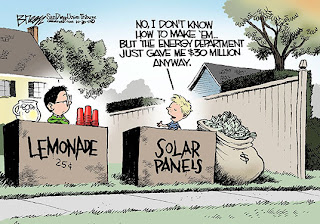Germany faces some painful Truths on Green Energy
 Cartoon: Steve Breen.
Cartoon: Steve Breen.
Authorised by: Viv Forbes, Chairman.
Germany, more than any other country, has led the green/global warming hysteria. It is therefore appropriate that Germany is now starting to reap the dividends from that destructive chapter – soaring electricity costs and now the real chance of blackouts during the next cold, windless, gloomy winter.
Germany has access to four proven and efficient methods for generating electricity:
• coal (domestic lignite),
• nuclear (domestic and imported from France),
• gas (imported from Russia), and
• hydro (domestic and imported from Scandinavia).
However, German Greens oppose construction of any new coal, nuclear, gas or hydro plant; are forcing the closure of nuclear plants; would like to see closure of coal plants; and oppose exploration for shale gas in Europe.
What do they expect to keep the lights on in Germany? Wind and solar energy.
Fritz Vahrenholt was a hero of the German Greens for decades. He wrote a best-selling book on the dangers of chemicals in the environment, became a "Senator for the Environment", advised Shell on improving its environmental credentials, was CEO of a wind energy company and, until recently, was in charge of the renewable energy division of RWE, Germany's biggest energy company.
However he has suddenly fallen out of favour with the Greens because he wrote a book:
"The Forgotten Sun – Why the Climate Catastrophe is not taking place".
In this book he concludes that the IPCC has underestimated the role of the sun in determining earth's climate, failed to forecast the fact that world temperatures have been on a plateau for 15 years, and ignored the natural 60 year Pacific Decadal Oscillation.
Vahrenholt has also learned some painful practical lessons about green energy.
He relates a story on how RWE invests 1.2 billion euros in renewable energy but that huge investment generates unreliable energy and no profits.
"What Germany is doing now is incredible. Although we get the same amount of sunlight as Alaska, 800 hours a year, we have installed 50% of the global solar PV capacity. With all these solar roofs we generate only 3% of our electricity but it is costing us 8 billion euros a year! And this will go on for twenty years because of the feed-in tariff. One of the arguments is that it’s generating jobs but this is only partly true, because nowadays 85% of the panels are coming from China and the US." He describes the difficulties solar energy causes to the grid, and the negative economics of buying electricity when it is expensive and being forced to sell it, sometimes at negative prices. "Our current approach is a dead end".
Vahrenholt also notes that "Only Europe, Australia and New Zealand are taking measures against carbon dioxide but these countries emit only 14% of the world's total. . . . we're destroying the foundations of our prosperity . . . and putting at risk our automotive, steel, copper, chemicals and silicon industries."
The European Energy Review has a long thoughtful article on the message that Fritz Vahrenholt has for green energy "experts" in Germany (and Australia). It is well worth reading carefully:
See also: Germany fears de-industrialisation:
German Energy on the Wrong Track
"Indeed I think we (Germans) are on an awkward energy path."
"To give a few examples: on twenty per cent of our agricultural land we are growing energy crops, mainly corn. This monoculture is endangering natural diversity. We are burning wheat to produce bio-ethanol. For the first time in forty years we even have to import wheat. Importing food like wheat for energy use, is that really the solution we want?
"Several federal states (Länder) are opening up their forests for wind energy with dramatic impacts. For each wind turbine you have to cut a hole in the forest of five to seven hectares. To build a turbine of 80 tons you need big cranes and a road through the forest. A lot of forest will be destroyed and many animals, like bats for example, will be killed. The fear for climate change is so big that the Germans are even sacrificing their forests." - Fritz Vahrenholt, Chemist, Environmental Campaigner, Renewable Energy Executive, Author.





No comments:
Post a Comment